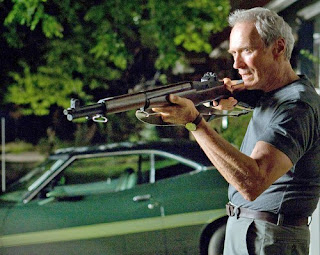
Iconic actor/director/producer Clint Eastwood’s newest film Gran Torino tells the story of what would happen if Dirty Harry retired from the auto industry and lived in the suburbs. Ok, not exactly, but it does further cement his reputation as a man now well into his late 70’s who is truly a legendary force both behind the camera and in front of it. Walt Kowalski (Eastwood) is the rock that although has been aged and hardened by the rivers of life, hasn’t budged an inch for years. He likes his cars, his beer and coincidentally, his neighbors, all the same way; American made and American born. A retired Korean War Vet, for nearly 50 years he has lived on the same block and worked for the same Ford company, alienating many of his family and closest contacts along the way. After the passing of his wife, Walt defiantly insists on changing virtually nothing in his pace or routine, despite the jest of his family members. Walt sharply holds onto his deep-seeded prejudices when a Hmong family moves in next door. Their lives collide when the youngest boy Tau attempts to steal Walt’s coveted 1972 Gran Torino car in response to neighborhood gang pressure. Through a series of cinematically programmed moments, Walt begins to lead the boy away from a life of gang-related violence.
There is a particular arc to this story that is never fully satisfied by its payoff. Much of Kowalski’s family is written into the script in order to set up Kowalski himself. They do little to drive the plot in any way on their own. His wife is all but absent from the story, mentioned only in passing. I couldn’t help but wonder what kind of woman she must have been to live with such a man for so long! The real treat here is to watch Eastwood perform with relentlessly channeled emotion. He still manages to easily convince us that he is indeed as tough as nails, and not just because it sounds like he is chewing them during every line of dialogue. He plays the character with such restrain and physical control, that we feel like the next word, the next push could finally set him off, without ever fully realizing such a climactic moment. The audience believes that it is Kowalski himself who is the only one who truly knows what he is capable of, and the tension it creates is genuinely palpable.
In the end Gran Torino has a little bit to say about the possibility for good to reside in all people, in any stage of life. It also has a bit to say on the responsibility that comes with understanding race relations in the ever-widening melting pot that is American culture. It is the presence and signature of a Hollywood veteran though that will tower over the film itself, long after the credits roll.
3/5
No comments:
Post a Comment